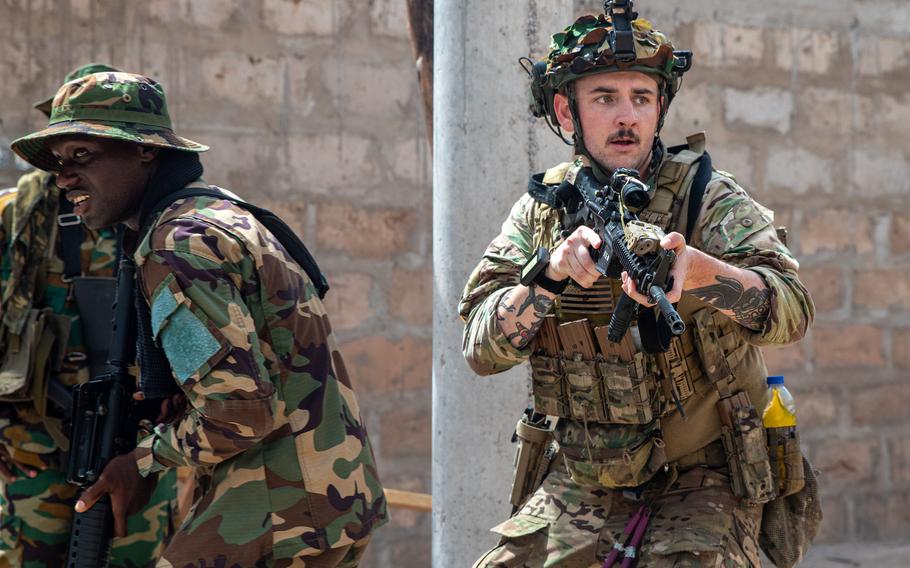
Sgt. Myles Shoemaker of the Maryland Army National Guard trains Ghanaian soldiers in room clearing tactics in Damongo, Ghana, May 16, 2024. Ghana is among the countries the U.S. is looking at working with more closely in light of recent coups and mounting terror threats in West Africa. (Caitlinn Belcher/U.S. Army Reserve)
STUTTGART, Germany — American troops are taking up new positions in parts of West Africa to give a boost to counterterrorism efforts upended following U.S. Africa Command’s recent ejection from strategic bases in Niger.
AFRICOM’s Gen. Michael Langley on Thursday said his command is in the early stages of a reorganization that will emphasize coordination with “like-minded” states.
“We are pivoting to some degree,” Langley said during a news briefing from his Stuttgart headquarters.
Benin, Ivory Coast and Ghana are some of the countries involved as AFRICOM begins to “reset and recalibrate some of our assets,” Langley said.
The moves come after the U.S. was forced to halt military cooperation with Niger following a coup last year that eventually led to the closure of bases that served as major hubs for U.S. counterterrorism missions. The centerpiece of AFRICOM’s mission in West Africa was a drone base in the Saharan city of Agadez, which cost the U.S. more than $100 million to set up.
There are no indications that the Pentagon is looking to replicate a site of such scale elsewhere on the continent. But concerns over a growing terrorism threat from an array of Islamic extremist groups fanned out across the Sahel has put many countries under strain.
While ISIS and al-Qaeda linked groups have long been present in Burkina Faso, Mali and Niger, they have metastasized and moved toward the northern borders of Ivory Coast, Ghana and Benin, Langley said.
“We are in consultations … to decide what level of capacity they need to be able to successfully counter terrorism,” Langley said.
Langley said West African extremist organizations have aspirations of attacking the U.S. homeland. Nonetheless, such groups haven’t yet shown any capacity to strike out beyond the region, calling into question how realistic those larger ambitions are.
While Langley didn’t detail what the recalibrated mission in West Africa could look like, an AFRICOM team has been assembled to chart the way forward.
The Wall Street Journal on Wednesday reported that a U.S. Special Forces team is already operating in Benin’s largest city and de facto administrative capital, Cotonou, to advise troops there.
The newspaper also reported the U.S. is spending $4 million to refurbish taxiways and aircraft to support contracted helicopter and medic teams placed in Benin to assist with the evacuation of local forces wounded in battle. Green Berets also have been placed in Ivory Coast, where contracted surveillance pilots are providing intelligence support, the Journal said.
The emphasis on partnering with Benin and Ivory Coast coincides with a series of coups in other countries in the region, such as Niger, Mali and Burkina Faso. The coups require AFRICOM to cease direct military cooperation under U.S. law.
Still, Langley said lines of communication with coup leaders will remain open while higher U.S. command authorities determine the “breadth and depth” of the relationship going forward.
Mixed in with the upheaval brought on by terrorist groups is Russia’s increasing influence on the continent. Russian government and paramilitary troops have established a presence in numerous countries, including Mali and more recently Niger.
“Russia has been destabilizing, from the Central Africa Republic all the way into Libya and across the Sahel,” Langley said.